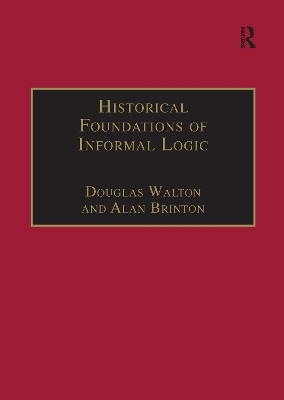
Historical Foundations of Informal Logic
Seiten
1997
Ashgate Publishing Limited (Verlag)
978-1-85972-588-7 (ISBN)
Ashgate Publishing Limited (Verlag)
978-1-85972-588-7 (ISBN)
- Titel z.Zt. nicht lieferbar
- Versandkostenfrei innerhalb Deutschlands
- Auch auf Rechnung
- Verfügbarkeit in der Filiale vor Ort prüfen
- Artikel merken
In response to the growing recognition of informal logic as a discipline in its own right, this collection of essays from leading contributors in the field provides the formative knowledge and historical context required to understand the development of a so far little studied subject area.
In just the last twenty years there has arisen a strong interest, especially among teachers of logic at the universities, in teaching techniques of applied logical reasoning and critical thinking. Many universities are now stressing these skills at an introductory level, and to meet the need, informal logic has begun to form and grow as a discipline in its own right. Like all subjects, it helps us to understand it if we can situate it in a context of historical development. This collection of essays provides the readings required to understand the development of a subject whose historical origins have been so far little studied. Many of the chapters are written by scholars in philosophy and speech communication who are themselves leading contributors to the subject, and their contemporary views throw light on how these earlier writers have influenced their thinking. This dimension gives an added interest to the essays, and indicates the way informal logic is currently evolving and seeking out its ancient historical origins.
In just the last twenty years there has arisen a strong interest, especially among teachers of logic at the universities, in teaching techniques of applied logical reasoning and critical thinking. Many universities are now stressing these skills at an introductory level, and to meet the need, informal logic has begun to form and grow as a discipline in its own right. Like all subjects, it helps us to understand it if we can situate it in a context of historical development. This collection of essays provides the readings required to understand the development of a subject whose historical origins have been so far little studied. Many of the chapters are written by scholars in philosophy and speech communication who are themselves leading contributors to the subject, and their contemporary views throw light on how these earlier writers have influenced their thinking. This dimension gives an added interest to the essays, and indicates the way informal logic is currently evolving and seeking out its ancient historical origins.
Douglas Walton, University of Winnipeg, Canada and Alan Brinton, Boise State University, USA
Contents: Introduction; The logic of Greek sophistry; The roots of informal logic in Plato; Aristotle and informal logic; Forms of argumentation in medieval dialectic; The Port Royal Logic; The Logick of Isaac Watts; Whately and the study of fallacious reasoning; Jeremy Bentham’s Handbook of Political Fallacies; Mill on inference and fallacies; Kant and informal logic; Informal logic in the twentieth century; Index of names.
| Erscheint lt. Verlag | 26.8.1997 |
|---|---|
| Reihe/Serie | Avebury Series in Philosophy |
| Sprache | englisch |
| Maße | 152 x 229 mm |
| Gewicht | 1110 g |
| Themenwelt | Geisteswissenschaften ► Philosophie ► Logik |
| Geisteswissenschaften ► Philosophie ► Philosophie der Neuzeit | |
| ISBN-10 | 1-85972-588-0 / 1859725880 |
| ISBN-13 | 978-1-85972-588-7 / 9781859725887 |
| Zustand | Neuware |
| Haben Sie eine Frage zum Produkt? |
Mehr entdecken
aus dem Bereich
aus dem Bereich
ein Gegenentwurf zum kurzfristigen Denken : so werden wir zu den …
Buch | Hardcover (2023)
REDLINE (Verlag)
18,00 €


